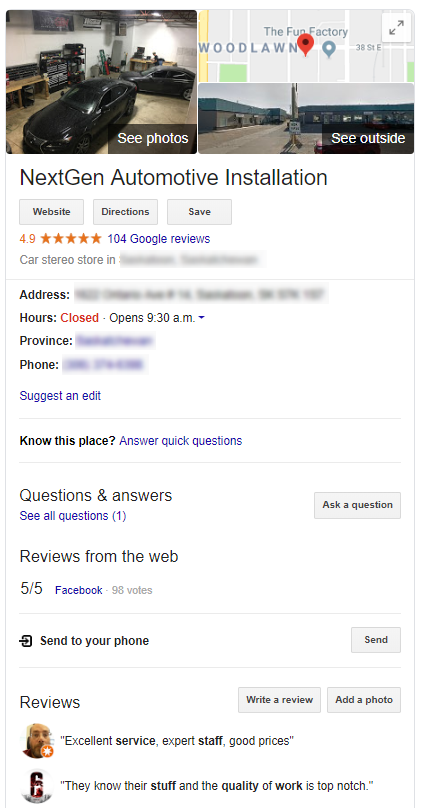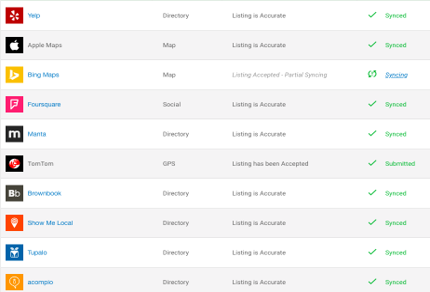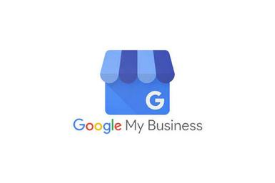Not giving a damn about your bad reputation is a great attitude if you’re an 80’s rocker. However, it’s not a great attitude for businesses. In the past businesses had to rely on traditional media campaigns, along with word of mouth for their reputation. Today, brand awareness is more prevalent than ever. With multiple online review platforms that are easily accessible for customers to share their experiences, prospective customers can read everything that’s being said (good and bad!) about a business.
Exercise 1: Google My Business for Brand Awareness
Google My Business Listing
When you search a business on Google, you probably notice their business pop up on the side of the search results showing:
- Reviews
- Address
- Hours of Operation
- Phone Number
What you might not know is that this is what is called a Google My Business (GMB) Listing.
 All businesses need a GMB listing, as it provides relevant information quickly to consumers when they search for your business on Google.
All businesses need a GMB listing, as it provides relevant information quickly to consumers when they search for your business on Google.
How does a GMB listing help?
- Listing pushes data to Google Maps
- Shows up at the top (side) of Organic Search
- Allows consumers to review your business
- Shows all relevant contact information
Setting up a GMB Listing is simple, and can be done in one of two ways:
1) Creating a New Listing:
If your business is data is not already listed on Google, you can manually update and add this information into Google’s database. This information will then be verified by Google via phone or postcard to ensure accurate representation from your business.
2) Claim Existing Listing:
Google may already have your business info, if so, then great! Google gives business owners the option to claim existing listings. Once again Google will verify the request of ownership via phone or postcard.
After you claim your GMB listing, your business will be able to:
- Respond to Reviews or Report Reviews
- Upload photos of your business
- Update Contact Information
*this can be extremely helpful for relocated businesses
Exercise 2: Request Google Reviews for Brand Awareness
Request Reviews
I f you have created/claimed your business’s GMB listing, then your next step is asking satisfied customers to leave you a review. Great reviews do many things for a local business:
f you have created/claimed your business’s GMB listing, then your next step is asking satisfied customers to leave you a review. Great reviews do many things for a local business:
- Advertise a business’s ability to provide quality customer service
- Establish trust between a consumer and a business
- Attract new customers to an establishment
There are many different ways to get your customers to leave a review, here are the few that are trending:
- Storefront tablet (quick and easy)
- Add messaging to receipts “Please share your experience with us on Google!”
- Review requesting as a part of email marketing
- Simply ask!
(sometimes a nudge is all a customer needs)
Exercise 3: Consistent Listings Check for Brand Awareness
Consistent Listings Check
 So, there are a lot of different sites that offer business listings. The main areas where a business could be listed are:
So, there are a lot of different sites that offer business listings. The main areas where a business could be listed are:
- Search Engines
- Social Sites
- Review Sites
- Directory Specific Sites
- International Sourced Sites
 As a business, you customers are looking for consistent listings information across the board. If they look you up on Facebook, then it should match the information seen on Google! Be sure to check that your business information is consistent across ALL sources.
As a business, you customers are looking for consistent listings information across the board. If they look you up on Facebook, then it should match the information seen on Google! Be sure to check that your business information is consistent across ALL sources.
The most popular and heavily targeted sites for business listing information are:
- Yelp
- YellowPages
- Bing Local
Exercise 4: Search Your Business for Brand Awareness
Search Your Business
 All businesses have typed in their company name to see what search results come up. For smaller businesses, the company page may not even rank on the first page of Google. This is a problem!
All businesses have typed in their company name to see what search results come up. For smaller businesses, the company page may not even rank on the first page of Google. This is a problem!
For most businesses, there can be irrelevant information that appears with this search.
All businesses have typed in their company name to see what search results come up. For smaller businesses, the company page may not even rank on the first page of Google. This is a problem!
For most businesses, there can be irrelevant information that appears with this search.
Businesses will want a variety of sources pointing towards their business online.
- Websites
- Listing Sites
- Blogs
- News Articles
Google is scraping any content that they find relevant to a business. So, businesses should be looking to produce relevant content.
Exercise 5: Add Content Regularly for Brand Awareness
Add Content Regularly
Before a business starts to write a bunch of content on their website, they must first identify their tone and brand voice.
Questions that should be asked:
- Who is your audience?
- What personality do you want your brand to portray?
This can greatly affect the way you tell your brand story and position your products and services to your target audience.
Consider a business blog! A blog is a great way to provide useful information to your clients, and also generate organic search traffic by ranking for industry-related keywords on Google and other search networks. What you might write on your blog is up to you, but here are some ideas to start:
- Helpful articles about your industry/products
- Product and feature updates
- Press releases
- “Behind-the-scenes” company culture articles





